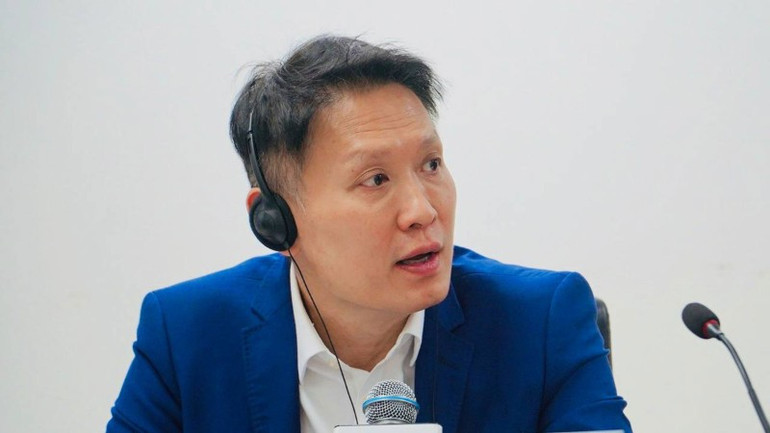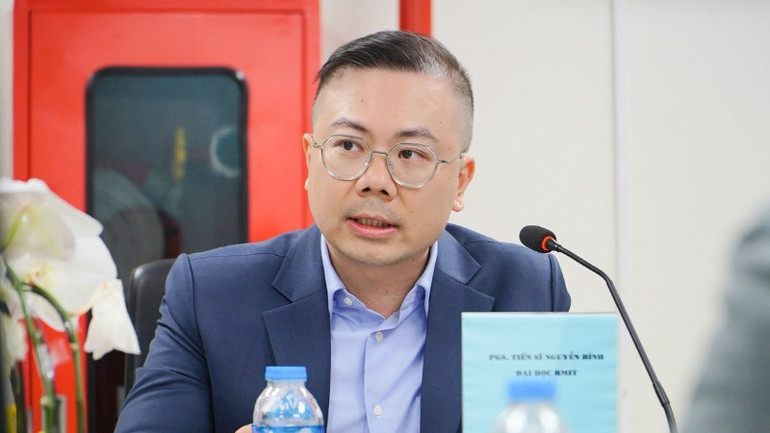
Golden opportunity for Vietnam
The global digital asset market is growing rapidly. Many countries and large financial institutions such as the US and Blackrock have sent clear messages, affirming that digital assets will not disappear but will reshape the traditional financial industry.
In that context, Vietnam also shows its acumen by continuously having related regulations and bills.
“We see Vietnam as an important link in our strategy to develop and promote global digital assets. Not only its current value, Vietnam is a market with great potential in the future,” said Richard Teng, CEO of Binance.

Mr. Nguyen Manh Cuong, former Deputy Chief of Office of the Ministry of Science and Technology , Deputy General Secretary of the Vietnam Automation Association, said that Vietnam is at a turning point in establishing a clear legal framework for digital assets.
There are 6 important highlights: Digital assets have been included in the group of objects that need to be monitored and researched to build a suitable management mechanism; the legal framework is gradually being formed; some localities such as Ho Chi Minh City and Da Nang have pioneered in testing and proactively approaching this field; relevant management organizations, such as the Ministry of Finance and the State Bank, are researching digital asset models associated with real values...
This will be an important premise for the digital asset sector to make a strong contribution to the digital economy , opening up new growth drivers for Vietnam. Issuing a legal framework for digital assets is a big challenge not only for Vietnam but also a global issue because this field is so new and changes rapidly. Therefore, the key factor is how to balance the law and innovation. If Vietnam can take advantage of this wave, it can become a model because many other countries are also looking to approach it.
Challenges in enacting laws on digital assets
In June 2025, the National Assembly officially passed the Law on Digital Technology Industry, marking the first time in Vietnam's history that digital assets were recognized in the national legal framework. This law will take effect from January 1, 2026.
Associate Professor, Dr. Nguyen Binh (RMIT University) affirmed that although there have been important steps forward, there are still some legal gaps that need to be further improved.
“Issues related to digital securities and fiat currencies on ledgers are not yet fully regulated. These are potential areas but also carry many risks, requiring a clear legal framework to protect users, investors and businesses operating in the field of digital assets,” Mr. Binh emphasized.

Mr. Nguyen Thanh Trung, CEO of Sky Mavis - Vietnam's first blockchain unicorn, shared his surprise at seeing Vietnamese lawmakers approaching the technology so early. However, he also worried that if not carefully researched, there would be limitations in implementation.
Previously, activities related to digital assets were considered to be in a gray area, meaning that businesses did things that were not prohibited by law. But the latest draft resolution on piloting the crypto asset market has a point that is different from the world, which is to stipulate that activities not mentioned in the law will be prohibited. This inadvertently creates limitations.
Moreover, such regulation also affects the innovation space in the context of Vietnam emerging as a global bright spot in the blockchain field.
“Personally, I think that Vietnam’s enactment of a law on digital assets will be a golden opportunity for both the market and businesses. Speeding up the draft is good, but if done incorrectly, it will lose the opportunity and could cause Vietnam to fall behind on the world technology map,” said Mr. Trung.
From the perspective of innovative enterprises in the blockchain industry, Mr. Tran Huy Vu, CEO of Kyber Network, said that Vietnam has an advantage in the field of digital assets. The promulgation of a law on digital assets can help domestic enterprises receive more support from authorities. However, on the other hand, authorities may not have enough time to fully evaluate the potential of small applications to facilitate development.
“The nature of technology is to develop very quickly. There are applications that are very small now but in just 3-5 years can become important pillars. If the law is not open enough to give new products the opportunity to develop, it will be difficult to have big echoes in the future,” Mr. Vu worries.
From international experience, Binance CEO Richard Teng believes that the Government and lawmakers will play an important role in supporting the future development of the industry.
“I think technology, especially blockchain, is developing very quickly and strongly. It is like water, if we try to stop it, the water will still find a way to continue flowing. Over-regulation can make it harder to control and pose more risks. A ‘smart legal framework’ will help balance innovation and reasonable risk management. When that is done, the digital asset industry in Vietnam will have a solid foundation for long-term development and expansion to the world,” said Mr. Richard Teng, CEO of Binance.
With the right legal framework, cryptocurrencies can become an effective tool to enhance transparency and support global anti-money laundering efforts. Legal perfection will help Vietnam grasp the global trend in managing and promoting the digital asset industry.
Source: https://nhandan.vn/co-hoi-de-viet-nam-tro-thanh-thu-phu-nganh-cong-nghiep-tai-san-so-post894245.html

































































































Comment (0)